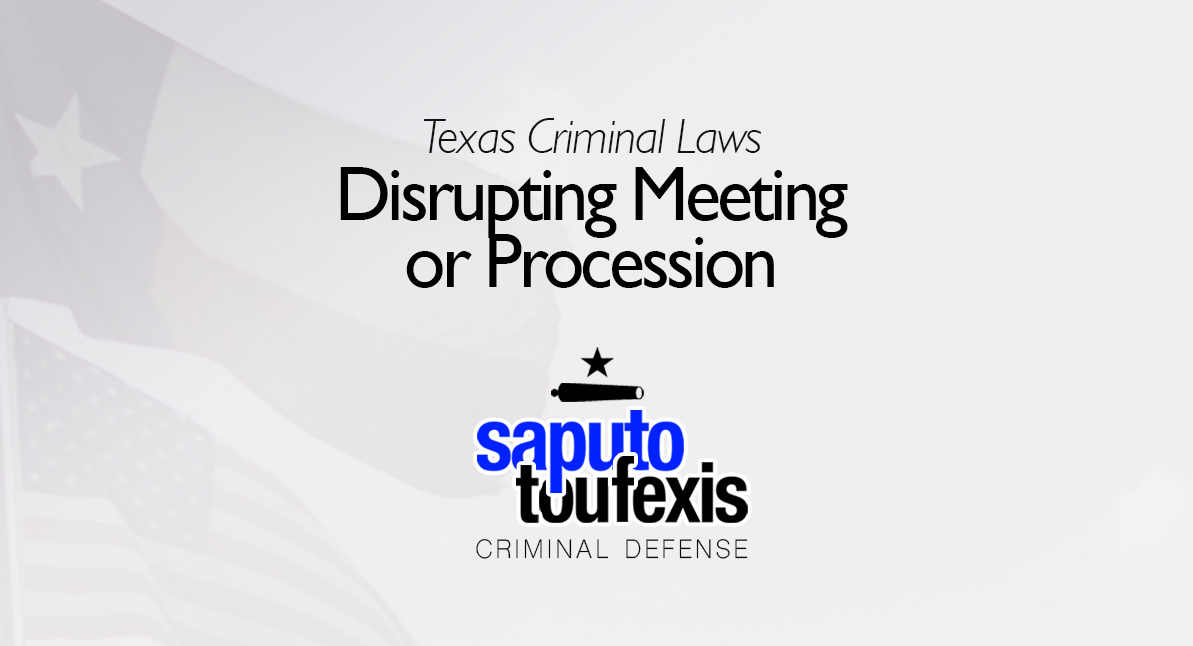The Texas Disrupting Meeting or Procession law prohibits obstructing or interfering—by physical action, “verbal utterance,” or electronic disturbance (including hacking) of any virtual component—with a lawful meeting, procession, or gathering, whether in person or virtual, when done with intent to prevent or disrupt.
FAQs about the
Disrupting Meeting or Procession law in Texas
- What is the current Texas law about Disrupting Meeting or Procession?
- What is the penalty for a Texas Disrupting Meeting or Procession offense?
- What changed in 2025?
- How can I be charged with a Disrupting Meeting or Procession offense in Texas?
- What is the statute of limitations for Disrupting Meeting or Procession in Texas?
- Can you get probation for Disrupting Meeting or Procession in Texas?
- What level of crime is Disrupting Meeting or Procession in Texas?
The Texas legislature codified this criminal offense in Texas Penal Code Section 42.05 and amended it in 2025 to add coverage for the electronic disturbance (including hacking) of virtual components of meetings. Those changes apply only to offenses committed on or after September 1, 2025. The law covered only physical action or verbal utterances for conduct before September 1, 2025.
The Penal Code classifies the Texas Disrupting Meeting or Procession law under Title 9 “Offenses Against Public Order and Decency,” Chapter 42 “Disorderly Conduct and Related Offenses.” Learn more about the Texas offense of Disrupting Meeting or Procession below.
What is the current Texas law about Disrupting Meeting or Procession?
AV Preeminent Texas lawyer Paul Saputo provides the current law defining Disrupting Meeting or Procession in Penal Code Section §42.05, as follows:[1]
(a) A person commits an offense if, with intent to prevent or disrupt a lawful meeting, procession, or gathering, whether in person or virtual, the person obstructs or interferes with the meeting, procession, or gathering by:
(1) physical action;
(2) verbal utterance; or
(3) electronic disturbance, including hacking, of any virtual component of the meeting, procession, or gathering.
For conduct before September 1, 2025, §42.05 covered only obstruction or interference by physical action or “verbal utterance.” The “virtual” and “electronic disturbance” language applies only to offenses committed on or after that date.[2]
What is the penalty for a Texas Disrupting Meeting or Procession offense?
A conviction for Disrupting Meeting or Procession in Texas is punished as a Class B misdemeanor,[3] with a maximum possible fine of up to $2,000 and jail time of up to 180 days.
What changed in 2025?
In 2025, the legislature broadened Disrupting Meeting or Procession by (1) making clear that the law applies to meetings, processions, and gatherings conducted “whether in person or virtual” and (2) adding a method of disruption for any virtual component of a meeting — “electronic disturbance, including hacking.”[4] These changes apply only to offenses committed on or after September 1, 2025.[5]
How can I be charged with a Disrupting Meeting or Procession offense in Texas?
You can be charged with Disrupting Meeting or Procession in Texas if the state’s attorneys believe that each of the elements of §42.05(a) as described in the section above have been met.
What is the statute of limitations for Disrupting Meeting or Procession in Texas?
As a misdemeanor, Disrupting Meeting or Procession charges have a two-year limitations period.[6]
Can you get probation for Disrupting Meeting or Procession in Texas?
The Texas Code of Criminal Procedure allows both judges and juries to grant probation for Disrupting Meeting or Procession, and judges are also allowed to accept deferred adjudication plea deals.[7]
What level of crime is Disrupting Meeting or Procession in Texas?
The Penal Code classifies Disrupting Meeting or Procession as a Class B misdemeanor.
Learn more about the penalty range for this offense in the section above.
Legal References:
^1. Texas Penal Code §42.05. This law is current as of 2025.^2. HB 5238, 89th Legislature (RS), Section 2^3. Texas Penal Code §42.05(b)^4. Texas Penal Code §42.05(a), as amended by HB 5238, 89th Legislature (RS), Section 1^5. HB 5238, 89th Legislature (RS), Sections 2–3^6. See Code of Criminal Procedure 12.02(a)^7. See Chapter 42A, Texas Code of Criminal Procedure, Art. 42A.054, Art. 42A.056, Art. 42A.102










